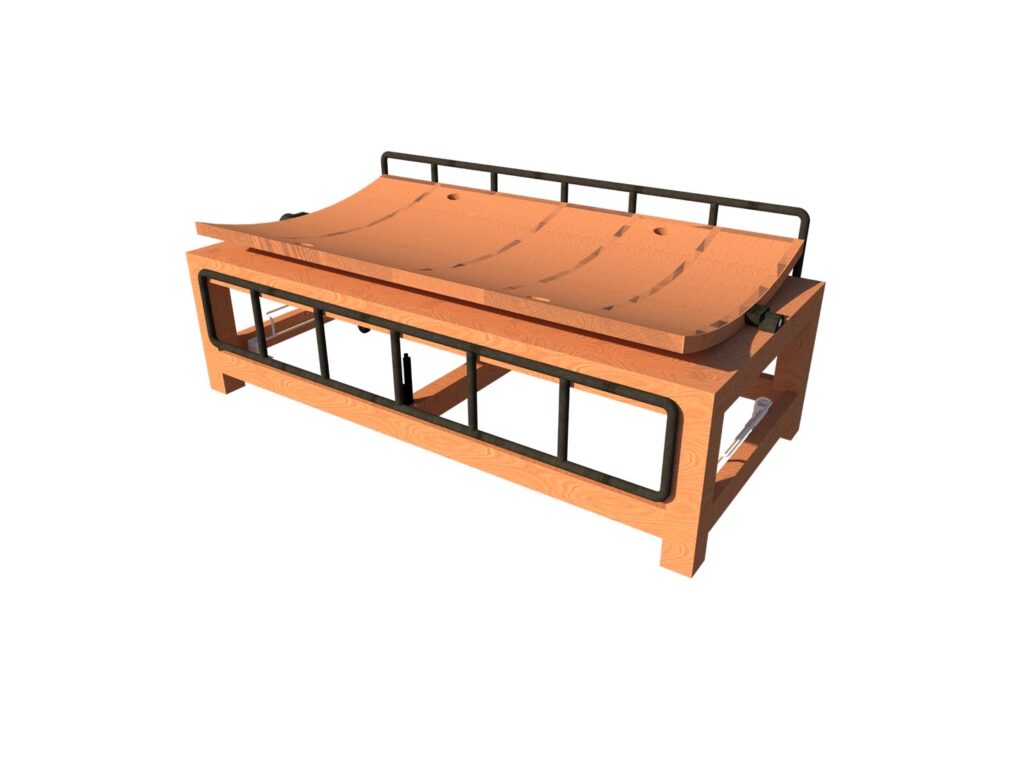The Smart Bed that is offered with an affordable price will be an alternative for preventing bedsore by assisting the turning of patients and thus suits bedridden aged patients. The Faculty of Associated Medical Sciences, KKU, is now ready to transfer the technology at communities for their own production and income building.
April 13 returns for another year, reminding people of the importance of the elderly. Meanwhile, reports about caregivers or relatives hurting bedridden elderly are still a regular issue in the news, reflecting the pressure and load of these caregivers. The problem may become worsened in the future, during the present aged society of the country.
Just recently, the Faculty of Associated Medical Sciences of Khon Kaen University has developed the Version 3 of a “Patient-Turning Bed that Lessens Bedsore” for bedridden aged patients in the community. This special bed has been invented by Prof. Wichai Ungpinitpong, Ph.D., a lecturer of the Faculty of Associated Medical Sciences, KKU, and his team. He mentioned that Thailand has completely entered the aged society after the aged population reaches over 20% of the whole population. In Khon Kaen alone, there are 260,000 elderly population, 20,000 of whom are bedridden, or roughly 5%, a group that needs to be closely taken care of.

The patient-turning bed to lessen bedsore, Version 3, is specific in the height of 60-70 centimeters, soft and packed cushion, which effectively distributes pressure. Therefore, the bed helps lessening bedsore that can lead to infection and death. The bed is made of wood and metal and works by means of an electric motor that assists in turning the patient through the control switch that can be monitored by the patient himself. Only one caregiver can manage the care of the bedridden patient. The cost of this bed is only 10,000 baht, and thus is affordable by an elderly in the community.


“We know that up to now, patients in the community do not have access to quality patient beds. For example, at Ban Ton Community, Phra Yuen District, Khon Kaen, there are 12 bedridden aged patients, but there are not enough patient beds for all of them. When a patient died, his bed would be reused by another patient. If a quality bed is more affordable and accessible, then the patients in the community will not face the problem.”

Dr. Worawut Chomphupan, a lecturer of Sirindhorn Public Health College, Khon Kaen, Faculty of Public Health and Allied Health Sciences, Phra Barom Chanok Institute, stated that some elderly patients are bedridden patients that need caregiving. However, their children may not have enough time. The College therefore cooperates with the Faculty of Associated Medical Sciences to select and transfer the beds to the elderly bedridden patients. Now, 3-4 patients have received the beds and the feedback was good, for they do not have problems about bedsore.
Miss Homklai Chaipimoon, aged 57 years, a villager at Sam Sung District, Khon Kaen related that her 96-year old mother is bedridden after a fall and breaking of her hip. Formerly she lied on the floor and every time she turned, the hip ached. It was also difficult to sit up. When she has the bed, the care is easier and there is no more bedsore.
“As a caregiver, I’m also old, and it hurts when bending or kneeling to help turning my mother. This bed helps a lot. When I have to out, my mother can switch on for turning. The others who don’t have the bed have bedsore. It would be good for them to have the bed.”
Prof. Wichai Ungpinitpong, Ph.D., a lecturer of the Faculty of Associated Medical Sciences, KKU, added that Khon Kaen University has integrated bodies of knowledge from many faculties and entered the communities under the U2T Project. KKU has trained community people so that they have the skills in caregiving of patients. Village volunteers have been trained. Physical therapy clinics, laboratory clinics and Chinese medical clinics are to be opened in communities soon.
In addition, the Faculty offers the exercise training to the elderly who stay at home so that they can most of the time depend on themselves. There will be the training in May for the community to learn to produce this smart bed that helps the patient turning. This will bring some income to the community, too.
News: Phanit Khatanak


